My Lonely Goalpost #1 – Lex Gold CBE
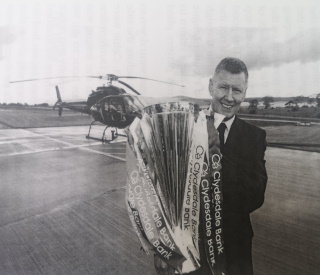
Recollecting the life of Lex Gold CBE is an extremely fascinating story to listen to. His story takes him from the fierce competition of Scottish Schoolboy football in the 1950’s to signing professional forms for one of the biggest teams in Britain. Through his determination and ambition he relinquishes this opportunity to have a distinguished career in The Civil Service. His footballing life goes full circle through being appointed as Executive Chairman of The Scottish Premier League.
Lex Gold CBE is an extremely generous and warm human being. Listening to his array of stories was an absolute pleasure. It actually taught me much more than the football stories he shared. He reinforced that having decent values are a way in which you should live your life. The values of being kind to others and valuing the friends and family you have.
He even sent me a copy of his memoirs to assist me within an hour of the end of our conversation. Gold gives a fascinating insight to the world of schoolboy and professional football.
“I still love it, I love it to this day. The idea of the skill, the physicality, the speed and the combination of it all,” are the precise yet thoughtful views of what Lex Gold CBE loves about football. This was as we concluded our discussion about football. It was the end of a fascinating couple of conversations that reached beyond the football discussion that I anticipated whilst dialing his number.
Born in 1940 and growing up in Douglas Water, a small mining village in Lanarkshire, Gold was exposed to football as village life revolved around it. “I just grew up with it and it was a way of life,” were identified as his reasons to love football.
I was transported to those streets where youngsters would play with either a hard leather ball or similar and play on the cobbled streets. Gold did not describe the streets and call this stereotypical but these are sentimental thoughts that makes football a magical sport for millions.
Gold was an athletic young man, a keen runner and would try and find every opportunity to play football. “I would try and find any spare bit of land to play football.” (Gold, 2011, p.5).
Douglas Water Thistle were the first team he supported and he loved going to the ‘Village Mecca’ to watch them play. If he was bored through a poor match he had a ball at the ready to distract him. He would find an area to play in the abundance of space with his pals. If this happened they avoided disturbing the adults playing in the main event (Gold, 2011).
Schoolboy football was a competitive arena and Lanark Grammar, Gold’s school were involved in some close matches. Before the final of The 1955 Stark Cup, Gold made the fatal error of putting soap in his hair before the match to hold it in place. He did not take into account the rain that followed. As a consequence he spent the majority of the match trying to remove soap from his eyes. (Gold, 2011). Not the skill set you would associate with playing centre half. Lanark subsequently lost this final.
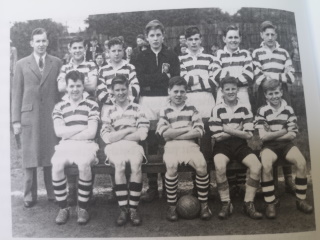
Lanark Grammar had a rivalry with Our Lady’s School where they lost 3-2 at Motherwell’s Fir Park in the final of The Keith Cup. It was impressive that many of the big schoolboy cup finals were played at the biggest grounds in Scotland. Old Lady’s had a reputation for producing many Celtic players through their Catholic heritage.
Our Lady’s School were led by Billy McNeill who would enjoy a fantastic footballing career with Celtic. McNeill certainly got used to lifting trophies and none were bigger than The 1967 European Cup, where the ‘Lisbon Lions’ defeated Inter Milan 2-1.
It struck me just how modest Gold was in our conversation and stated that he was lucky to achieve some success at schoolboy level. The Scottish Schoolboy Shield was the Holy Grail and Lanark Grammar missed out on a few occasions. In 1959 it all culminated in a superb final year at school for Gold. A year which produced some of the most memorable schoolboy football in the history of The Scottish Schoolboy Shield.
There were many changes made to the team, one being that Gold moved forward into inside right. Lanark decided to adopt a youthful policy and many younger players joined the team. One such player that made a difference was Roger Hynd who went on to play professionally for Rangers, Crystal Palace, Birmingham and Walsall (Gold, 2011). I later found out that Hynd played in 1967 Cup Winners Cup Final defeat for Rangers against Bayern Munich.
Hynd was described as being very physical, strong and athletic. Gold mentioned that Hynd was a decent human being and watched him occasionally for Crystal Palace whilst living in London. He recalled watching Palace play Ipswich and it was evident that Gold was proud to watch a friend he had grown up with.
They had that history of their upbringing in Lanarkshire and Gold’s voice rose instantly whilst recalling Hynd’s mother, who seemed a formidable lady. “She was something else. She was like her brother, Bill.” This Bill being the great Bill Shankly who started the Liverpool Footballing Empire in the 1960’s. One of the greatest football mangers of all time.
Other changes to Lanark Grammar’s side included Gold’s brother, John being added to the team. John was three years younger and Gold stressed to me that, “they were the youngest team in the competition.” Another notable player was Lex’s future brother in law, Alex Brooks, who kept goal. His performances being instrumental in Lanark not conceding a goal until the final (Gold, 2011).
The 1959 Scottish Schoolboy Shield Final was against Dumfries Academy and what a marathon it turned out to be. In fact it took three games to decide a winner. The beauty of football in those times was that they were hard fought occasions that required maximum concentration.
There is a rush to play matches in this day and age and replays are beginning to be a thing of the past. People often say that penalty shootouts require mental strength, I beg to differ. Surely replaying your opponents in a cup final marathon requires many physical and psychological challenges.
Having maximum psychological concentration is a necessity as you are beginning to know the strength of your opponents and possibly worry that they in turn know your weaknesses. Physical fortitude is needed in an abundance to keep dusting yourself off again and going again against the same opponents.
The first of the matches took place at Hampden, the home of Scottish football. I can only imagine the occasion and a tight match ended in 1-1. Alex Brooks in goal played a blinder, keeping Lanark in the final (Gold, 2011).
The replay was played in front of 4000 spectators. Let’s say that again. 4000 for a schoolboy cup final. That is more than some professional football matches of any era. What struck me is the foundation this provided for the schoolboys to enter the professional game. It was like an apprenticeship. A necessity to acquire the essential skills required to compete on the competitive football field.
The first replay finished 1-1 at Ardeer and the second replay was heading the same way as it was 1-1 going into the final minute of extra time. There was a cross from the left that fell to Gold’s brother, John. He struck the winner from the edge of the box. Gold was routed to the spot in exhaustion. He had to muster the energy to lift the massive shield that covered half of his body (Gold, 2011).
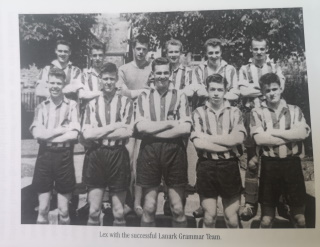
Three double decker buses had travelled to Ardeer that contributed to a second 4000 plus crowd. What a thrill it must have been to lift the mammoth shield. This ended six years of competitive schoolboy football that took Gold up to the age of eighteen (Gold, 2011).
Reflecting on the final Gold recalled:
“The final whistle blew shortly afterwards and I was presented with the trophy on the field and lifted onto my team mates shoulders. It was sad that there had to be a loser. Dumfries was a great team, a fine bunch of lads and friendships were forged that last until today”
(Gold, 2011, p.20).
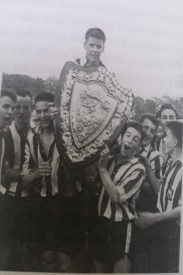
Straight away I am imagining a football world that I can only dream of. Tough players giving their all during their youth for themselves and their team mates. I am recalling all of the footage of the 1950’s and can picture these matches as a substitute for any black and white replays I have seen. I loved the community vibe and that the whole school was rooting for you. A time of traditional sporting values.
To paint this picture Gold said, “I was fortunate to enjoy some success with my teams and I was just the player chosen to lead my team.”
University beckoned as he had acquired enough higher grade passes to study at Glasgow University. Here he was going to read History and Language. On his penultimate day at school, Gold received this news and left school early to share the news with his parents. This excitement got him in trouble the next day with his head teacher, Mr Hamilton. He received the strap as a consequence for leaving early. No exception was made for his exceptional academic record (Gold, 2011).
In fact, he left with a written reference from the head teacher with some very kind and generous words. A letter Gold kept but did not use during his career. Gold described Mr Hamilton as a remarkable man. There was no grudge for the strap, just a sense of guilt from his behaviour (Gold, 2011).
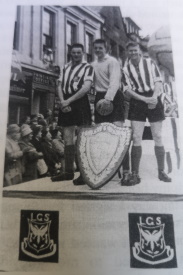
There was an alternative career path on offer rather than studying at university. The lure of professional football was too much to resist. There were some mind blowing offers on the table. He had offers from Manchester United, Leeds United, Kilmarnock, Airdree, Motherwell and Rangers.
Whilst playing for his junior team, Douglas Water Thistle, Gold returned home after a 5-0 defeat in a terrible mood that resulting in him throwing his boots against the garden fence. As he entered his house he saw Bobby Ansell, the Motherwell manager sat with his Mum and Dad. He wanted to sign Gold but the following day he had a meeting with the Rangers manager, Scott Symon at Ibrox (Gold 2011).
Gold said, “I signed for Rangers because they were my boyhood club.” He suggests that signing for Rangers was maybe not his best ever move. He wondered about what might have happened if he signed for Motherwell with ‘Ancell’s Babes’ (Gold, 2011).
This team consisted of some great players that Gold had come across as a junior player. Two players of note were Ian St John and John McPhee. These two players played for Douglas Water Thistle and both went on to have illustrious careers south of the border with Liverpool and Blackpool in the First Division.
In recalling Ian St John play Gold said, “growing up I saw Ian St John play for the junior team. I saw him playing as a sixteen year old and thought this guy was something else. It wasn’t physique, it was speed of thought and craft. He did extremely well at Liverpool.”
Gold was not alone in signing for Rangers. He was joined by his Lanark team mates Roger Hynd and Alex Brooks. As mentioned earlier Hynd was the nephew of the legend that is Bill Shankly. Just before signing for Rangers Gold was put on the spot by Shankly’s sister Jean. She told Bill that Gold had attracted interest from Manchester United and Rangers and asked what he thought? He looked Gold up and down and said, “He’ll nae dae.” Meaning that Shankly did not think that Gold would have a chance as a footballer.
As Gold had the pleasure to play with so many professional footballers, it only seemed right to ask him who was the best player he played with. It struck me that Gold is respectful to all that he played with.
He acknowledged that Roger Hynd was a very capable footballer but identified Alex Brooks, the goalkeeper that played at Lanark and Rangers. Gold said, “the best player out of the three of us was Alex Brooks, he was outstanding. Probably the best goalkeeper I’ve seen or had dealings with as a player. He was better than the professional guys I’ve met. He played nationally for Scotland at schoolboy level.”
Injury ended Brook’s career at Ibrox, where he was diagnosed with a sprained wrist but it was actually broken. He became disillusioned with the game and quit.
Rangers had a third team and Gold was chosen to be part of that team. He was in awe of many of the players that he had only read about on his first days training. Training involved lots of running and there was a pecking order of who should run where.
Gold pushed the senior pros to the limit with his stamina a consistent factor that helped him join the top of the pack. It was evident that his cross-country days from Lanark Grammar were helping him make an irritating impression on his new team mates.
Football was not what it is today where you can earn a small fortune if you succeed. Gold was ambitious elsewhere and actually worked part time for The Daily Record as sub editor, he persuaded Scott Symon to allow him to work there. This gave him the insight to the world of work and football was causing him some boredom. Gold decided to pluck up the courage to speak to Symon and inform him of his desire to quit Rangers. Gold said:
“I simply told him that I would be looking for another profession. I judge not too many players had given him news of that kind but he remained his natural impassive self throughout”
(Gold, 2011, p.33).
It is a fascinating insight to what the world was then. Having a career was deemed ever so important and football was still the game of the working class people. It had not found the riches that it has today. In England, football had a maximum wage of £20 per week and it was not until 1961 that Jimmy Hill had campaigned to abolish this wage structure. I suppose this was the start of the relationship between football and money.
Through speaking to Gold I feel money would never have kept him at Rangers if it was readily available like today. He had a desire to pursue new challenges away from the game. A desire to keep his motivation levels up. He had offers to join other clubs but his mind was made up.
On reflection of his time at Rangers, Gold said:
“My time at Ibrox was brief but significant. It helped to underline that I am very much a team player. I also liked the day to day discipline that went with being a professional…In the spring of 1960, I had to decide what to do with my working life…I was not entirely sure that I was either good enough for professional football or more particularly having started with one of the biggest teams I could settle for anything else”
(Gold, 2011, p.33-34).
In 1960 Gold left Rangers for good and pursued a distinguished career as a Civil Servant. This career took him down to London as a twenty year old to work. Football still played an important part in his life. After all, he loved the game.
He was able to watch many of the great London clubs at this time. He watched Arsenal, Fulham and Chelsea. Gold had an affection for Arsenal due to the link with Rangers. “I went to Highbury more often than the other two,” said Gold.
In discussing the type of football seen, Gold shared some of the physicality that was on offer through saying, “the thing about that time was it was much more physical. Players were in the team because they could clog. And that is what they did. That was at the top level too.”
I used Ron ‘Chopper’ Harris as an example as I had recently seen Harris interviewed about what it was like to play against Jimmy Greaves. Harris recalled that Greaves had only scored once against him, on his debut. He then mentioned that he wouldn’t let that happen again with a wry smile.
In referring to ‘Chopper’ Harris Gold said, “it is amazing you mention him because he was the guy I was searching for who I used to watch at Chelsea. He would just slide through people. He was not alone, every team had one because that was the way you played in those days. You just got stuck in. He got stuck in and did not mind how he got stuck in. He would not have got away with it today.”
Gold enjoyed visiting Craven Cottage to watch Fulham and admired Johnny Haynes. He was celebrated for being very technical and having attacking flair. Gold said, “Johnny Haynes was a fabulous player. Excellent on the ball but slow. You would not have known it because he was so good.”
Fulham’s Tosh Chamberlain was also mentioned as favourite to watch. “Tosh enjoyed a drink but was not a team player,” Gold recalled. Chamberlain was a number eleven and was a fans favourite with his maverick playing style. “He was the kind of player I would have liked to have been,” Gold said.
A famous match that dominated our discussion was the 1960 European Cup Final. “‘You want to know my greatest ever match? It’s easy. It’s the 1960 European Cup Final Between Frankfurt and Madrid. I can still remember the date now, the 18th May 1960,” Gold explained enthusiastically.
The Eintracht Frankfurt team were no pushovers and Gold recalled them being responsible for demolishing Rangers in the semi-final with an astounding 12-4 aggregate victory. Frankfurt were certainly at Hampden to defeat a Real Madrid side full of superstars.
The 1960 European Cup Final was held at Hampden Park in front of about 127,000 spectators. “That was crazy, just crazy,” Gold recalled. He digressed in remembering being part of a crowd for a Scottish Cup Final of over 140,000 to watch possibly Celtic and Kilmarmock.
“There was about 142,000 squeezed in there that day. They were all standing, no seating anywhere. I remember the BIG Glasgow policemen walking down the steps amongst us as we were all huddled shoulder to shoulder. They started picking some of us children up on their shoulders and made a big gap in the middle. They would shout to people waiting to come in and say ‘down here lads’ and squeeze us in.”
It is staggering the amount of people that would attend a game of football. It just goes to show the impact football had on the world in an era where there was minimal television coverage and certainly no digital television.
You had to be there to be part of it and then share the memories. How exciting it must have been to go back to your family and friends to share the spectacle you had witnessed. Back in the 1950’s and 1960’s you were the social media.
I was in envious of Gold being at the 1960 European Cup Final. What an opportunity to see Ferenc Puskás, Alfredo Di Stéfano and many other absolute legends live. These are players I have grown up reading about. I have observed how many people have complimented the skill and impact these players have had throughout footballing history. What an opportunity to chat about them with someone who was there.
“Di Stéfano was a fabulous goalscorer. A big centre forward, about 6’1 or 6’2. He was the main man in the Real Madrid scoring stakes. Puskás was a Johnny Haynes type player, two footed but his left was the strongest. He read the game like a dream. I suspect that Puskás was getting towards the end of his career, rather than the beginning,” said Gold.
I mentioned that as a youngster I had videotaped the twenty greatest goals of all time in 1987. I recalled the goal Puskás scored at Wembley in the 50’s being part of the collection. It was a beautiful goal with what can be only described as a drag back (Before there was a Cruyff Turn) and a rifled shot in the top corner. The black and white footage and the ecstatic commentary after captured the moment perfectly. Hungary and demolished England at Wembley Stadium. Gold stepped in, “you see that was the great Hungary team that were basically world champions throughout the 50’s. It would have been 53 or 54.”
Other players stood out for Gold in this match and he recalled Francisco Gento. “They had a guy on the wing called Gento and he was as fast a winger I had ever seen.” The centre back, José Santamaría was someone Gold remembered fondly through comparing him to Billy Wright. “A centre back called Santamaría and he was like Billy Wright. You remember Billy Wright? He was Wolves and England captain. He was a great reader of the ball.”
You can understand why this match would be remembered as a classic. Real Madrid won 7-3, with Puskás scoring four and Di Stéfano scoring three. I wonder who got to keep the match ball? It must have been truly remarkable to witness this historic occasion.
As Gold continued his career away from football it is apparent that he was a student of the game with astute observations. Gold told me that modern football is so much more technical and you simply cannot runaround.
Trying to compare players from generations is an argument that football fans love to partake in. It’s an argument that can never be resolved. I posed this conundrum to Gold and he was emphatic with his response, “oh yeah, absolutely.” He used Ian St John as an example in terms of his speed of thought and craft. Gold was equally thoughtful in comparing generations as he acknowledged the technical and tactical advancements of the modern day game.
It is evident that Gold is able to study a player as he is able to offer an instant analysis of their performances. These are not negatives but more of a critique for improvement. He acknowledged that Johnny Haynes was, “excellent on the ball but slow.”
In discussing Alan Hansen Gold instantly said, “Alan Hansen was a very good player but did not like running too much. He was a very good pundit as well. It was not all about Alan Hansen. It was all about the game.”
‘”I can tell you who my favourite player was, Dennis Law,” Gold said. We discussed his merits and his goalscoring ability was discussed. His work ethic for his teams, aerial ability and his technical ability were mentioned as his strengths.
I indicated that I had seen many video clips of Law and loved his goalscoring feats but thought that he was under rated in comparison to George Best and Bobby Charlton. Gold responded, “having Bobby Charlton next to him would enable the goalscoring business to be taken care of at Manchester United.”
It was if to state that there was nothing under rated about Denis Law and he was an integral part of the Manchester United success in the 60s. Gold was quick to stress that it was purely subjective and he was the type of player he liked.
The beauty of these greatest of all-time chats are that different players are identified and really all you can do is agree to disagree. There is no science to deciding who the greatest footballer of all time is. I will tell myself that next time I get into a heated argument.
It is fascinating that Gold is instantly able to identify strengths and improvements of these players in a considered and respectful way. It never dawned on me to ask Gold about whether he considered being a football manager. Writing this makes me think he would fit in with the legendary Scottish managers that were prominent throughout his lifetime. Managers that are part of football history as the greatest ever. Gold was happy to share some stories about the times he had interactions with some of the legends.
In 1964 Gold was playing semi-professional football for Hillingdon Borough, in the Southern League. He was introduced to Bill Nicholson, the manager of Spurs. Here Gold was working as an Immigration Officer at Renfrew Airport. His friend told Nicholson that Gold should be awarded a trial because he was one of the best inside forwards Scotland has ever produced. Scouts were sent to watch Gold and he was offered a chance to go on trial. He refused as he had no wish to return to full time football.
Gold also had a chance meeting with Bill Shankly whilst sitting at the British Passport Control at Heathrow. Their last meeting was when Shankly said that he did not have a chance but Shankly recognised him from his younger days:
“It therefore came as a considerable surprise when he asked what I was doing at Heathrow and on being told I worked there he replied, ‘what a waste son, what a waste.’ I suspect his first view of my footballing ability was the more accurate”
(Gold, 2011, p.43).
Gold was not big headed in sharing these stories and it always struck me how humble he was about his footballing ability. He suggested that he was okay at football but would never go overboard about his ability. He said that he did not score many goals and was a more traditional midfield player.
In discussion about favourite players Gold asked who mine was. I had to mention Bryan Robson was my hero. Gold acknowledged that Robson was a fine player and he was a similar player to him. He wanted to stress that he was certainly not as good as Robson. There was that respectful modesty appearing again.
My opinion, for what it is worth is that he was a talented player. A player that seemed to have the credentials to go all the way. However, his desire and ambition away from football took him to a fulfilling career away from football. In some respects he had the best of both worlds where he could still play, spectate and enjoy football whilst having a distinguished career as a Civil Servant.
There were some brilliant moments of meeting some celebrities whilst working for the Immigration Office in the early 60’s. During his time at Heathrow Airport he shared an amusing story of when he met the famous singer, Gene Pitney. Gold chuckled:
“It led me to the stars. Gene Pitney came in and my colleague did not know him. ‘I’m an entertainer. 24 Hours from Tulsa’ [Pitney’s famous hit single]. My colleague said, ‘the transport desk is down there.’ He thought he was moving on to another country.”
He got to meet some of the beautiful female Hollywood stars of the time. “Sofia Loren was a beauty of the day. Claudia Cardinale, the Italian girl. I was just knocked sideways by her. Beautiful.”
He was certainly a lucky man to witnesses those beautiful women but the stand out story can only be when he meet Cassius Clay (Mohammed Ali). He was on arrival for his Boxing World Heavyweight Title fight against Henry Cooper.
“It was fabulous, where he came in with his minders and Angelo Dundee. I gave them permission to come in and they gave me two tickets for the fight. Me being me, I wasn’t going to take any freebies so I went to my boss. He said I could keep them.
“Fifth row from ringside I think. It was fabulous. I used to watch Henry Cooper quite a lot. To see him knock down Mohammed Ali was totally unexpected and brilliant. And the cheating that went on. Cus D’Amato, the trainer cut Ali’s glove and called the referee so he would get longer to recover. Then the next round he got in and beat Henry, Unbelievable.”
His career spanned nearly 50 years. His work life was fascinating to say the least. He worked for The Inland Revenue, The Home Office and supporting Scottish business amongst others. It lead to being given the honour of a CBE, presented from The Queen in the 2000 New Year Honours List. It was in recognition to his services to Scottish business. He said respectfully:
“I had to pinch myself that not only was I in such exalted company but that boy from a mining village in South Lanarkshire was being recognised in this way”
(Gold, 2001, p.88).
Football would make a return to Gold’s life in the 90’s were he was chairman of Hibernian and appointed as the Executive Chairman of The Scottish Premier League.
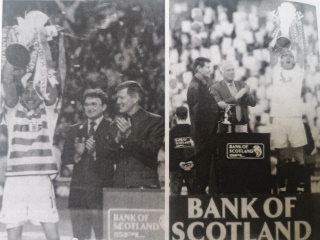
I asked how he became chairman of Hibernian and the Scottish Premier League. He was very dismissive of his skills and it was like he shrugged his shoulders to state, “I was good at administration and communicating with others.” He certainly did not make a fuss.
These roles required important decisions being made. These were always made for the good of the game of Scottish football. In an era where money talks and sponsorship deals are needed to be decided I can only begin to imagine the responsibility. Having chatted to Gold about his football heritage and those days of the Scottish Schoolboy Shield, a time he recalls ever so fondly I can see how he would want to take on such a challenge.
Gold was keen to develop young Scottish talent and improve the quality of the coaching. Here he developed some coaching seminars that was led by a who’s who of the football coaching world:
“Alex Ferguson, Gerard Houllier and Arsene Wenger came and helped lead the first seminar. Alex and Gerard came for the second year and we attracted Roy Hodgson and Paula Sousa on the third occasion. We also invited Scottish coaches based in England such as David Moyes and Billy Davies, to join their SPL contemporaries”
(Gold, 2011, p.111).
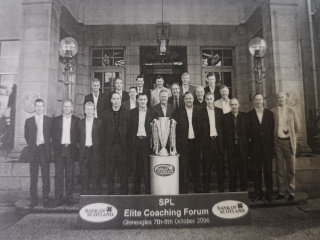
Gold asked me about my footballing life and I informed him about supporting Manchester United. He said that he knew Alex Ferguson very well through his time as being Executive Chairman of the Scottish Premier League. A story he recalled was from a celebration dinner for Scottish football with Ferguson present.
Ferguson had stated adamantly that he played against Gold as a schoolboy and remembered him. Gold was certain that they had never played against each other. Ferguson was with Bobby Charlton at this dinner. It is common knowledge that Sir Alex is usually correct. Ferguson is never incorrect. This is evidenced through his dealings with the media and his players.
Gold was certain that they had never played against each other. The next day Ferguson stated the time and place and it turned out to be Gold’s younger brother. What struck me is Gold’s strength in his belief and character. Extremely similar to Ferguson.
Gold is matter of fact with straight talking. Yet calm talking, with a firm approach. If I had the pleasure of meeting Sir Alex and the dubious pleasure of disagreeing with him, I would love to take Lex Gold’s approach.
Gold mentioned that Ferguson was a generous man and did so much to help others in Scotland and beyond. He stressed that he did a great deal of charitable work and always had time for others.
Gold was by no means name dropping but how often do you get the opportunity to chat about a man with such a distinguished career and someone I have idolised for a majority of my life?
Gold asked about my footballing background and if I watched Bournemouth, my local professional football team. I said it was virtually impossible to get tickets but shared that I was a regular in their promotion winning season under Harry Redknapp. I told him that I watched most weeks from 1991-1993 with my friends. Here I would catch the train with my mates to watch The Cherries play in the third tier of English football.
I informed Gold that from 1994 onwards I played football on a Saturday afternoon and would do so for the next twenty five years of my life. This prevented me from going to grounds watching football.
On a roll, I mentioned that when I was twenty I would play five aside football on a Friday night. I would then play ninety minutes on a Saturday and finish the weekend with five aside on the Sunday night.
Gold listened attentively and commented that, “you come from that era where all you wanted to do was play football. I was the same. I would play Saturday morning as full back, Saturday afternoon as outside left and then a match on a Sunday morning.”
Listening to Gold, I can hear the passion for football is still there. He is also razor sharp with his knowledge. He corrected me in over estimating the size of the Hampden Park Crowd at the 1960 European Cup Final.
He is what I would call your typical Scottish footballer from that era, think Bill Nicholson, Jock Stein, Alex Ferguson and Bill Shankly. All men with strong personalities and traditional core working-class values. I asked him on this as I compared my limited knowledge in comparison to that of Alex Ferguson.
I was stumbling around for words and used the working-class analogy where all in his club were treated as an equal. From the tea lady; to the kit man; to the players.
“All of those managers you mentioned had values. They were all born within a small distance from each other and there was a working-class culture, stemmed from the mining world that was prominent at this time. They brought these values into their football careers as players and managers,” Gold explained.
He was extremely warm and generous with his time and I wanted to say that I enjoyed learning about different eras and much more than football. He understood and said.
“The period we had least was in the 1940’s. I was born in 1940 and the war had just started. Up until 1947 you had rationing and you could only use coupons. We never had anything and these were the happiest years I ever had. It was a mining village. Tough. Good people. I was a lucky lad.”
I asked Gold if he regretted not pursuing a career as a professional footballer and his instant reply was, “no, I would not change a thing. I have been very lucky.”
I sensed that Lex Gold is a stand up type of guy who rolls his sleeves up and gets on with it. There is minimal fuss. He thanked me for indulging him. However, I believe I was the one being indulged with his array of stories.
The warmth in Gold’s voice is ever so clear and I am extremely proud to have had the opportunity to discuss his fascinating career and opinions on football and beyond. It allowed me a small insight into a world I could only imagine. At a time when football was the game of the people.
I think it is only right to let Gold have the last word. We finish with Gold mentioning that his brother, John was also on the board of The Scottish Football Association for a number of years.
“Two lads from a mining village. It hasn’t gone too bad on the footballing front.”
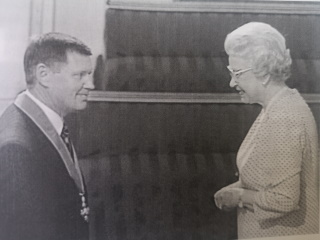
Bibliography
Lex Gold, Being Right Is Not Sufficient – Beyond Football: The Personal Memoirs of Lex Gold (The Choir Press, 2011).
